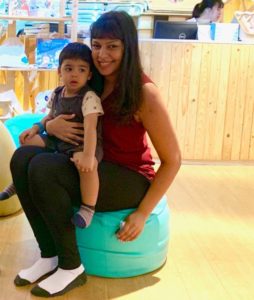Transitioning From Being A “Working Mom” To A “Stay-At-Home Mom” And Why Using These Labels Don’t Make Sense To Me
The labels society attaches to the different “kinds” of moms — stay-at-home (SAHM) mom, working mom, work-from-home mom, single mom, new mom, soccer mom etc — got me thinking about what “kind” of mom I wanted to be known as when I was expecting my son and I knew I wanted to be a “working mom”. That felt like the right label for me.
 I had a very clear plan that I would stay at home with my baby for 6 months, then hire a nanny and dive back into my career. It sounded like a good plan and a reasonable one too. There are so many women who successfully and smoothly transition back to work once maternity leave is over, so I assumed it would be the same for me.
I had a very clear plan that I would stay at home with my baby for 6 months, then hire a nanny and dive back into my career. It sounded like a good plan and a reasonable one too. There are so many women who successfully and smoothly transition back to work once maternity leave is over, so I assumed it would be the same for me.
I did go back to work after three months of maternity leave and I was excited to be a “working mom”. I thought it was the right decision and I was excited to be back in action at work. After my new mom fog vanished, it felt so good to be having normal adult conversations and to have some of my old life back.
It turns out I struggled much more than I expected with different parts of being a “working mom”. First, I didn’t expect to miss my baby as much as I did; second, I didn’t like the idea of someone else taking care of him for a large portion of each day; and third, I couldn’t focus at work or at home properly — I felt unhappy and divided all the time. So five months after returning to work I decided to take a break from my full-time career and be a “stay-at-home mom” and also develop a business which also made me a part time “work-from-home mom”. This allowed me to spend more time with my son and still have my own life in a way that makes me happy. Other moms (and dads) find happiness and success in different ways on the spectrum of parenting — there are no rules.
The point I’m trying to make is that all moms — regardless of label — love their children just the same; being present or away for short or long periods of time doesn’t change that for even a second. What I now realise — and want to bring to light — is that each mom has her own unique family and unique set of circumstances that lead to different motivations for choosing to be a certain “kind” of mom or parent. In my case, it was my own emotional struggles and desire for more flexibility that led me to become a “stay-at-home/work-from-home mom”. Is that something I will tell a random stranger or an acquaintance I may meet for five minutes? No. I just wouldn’t feel comfortable and it’s a pretty weird thing to tell someone I’ve never met before. But in those 5 minutes if it came up in conversation I’m a “stay-at-home” mom or that I don’t work, you can bet what assumptions have been made about me.
 Before becoming a mom myself, I was guilty of making certain judgments and assumptions of other woman around me who became moms. For example, I really admired the ones who decided to continue with their corporate lives because that’s the life I envisioned for myself as a mom. And at the same time I was always unsure why any woman would choose to stay-at-home if she didn’t have to because I didn’t understand the complexity of the mother-child relationship.
Before becoming a mom myself, I was guilty of making certain judgments and assumptions of other woman around me who became moms. For example, I really admired the ones who decided to continue with their corporate lives because that’s the life I envisioned for myself as a mom. And at the same time I was always unsure why any woman would choose to stay-at-home if she didn’t have to because I didn’t understand the complexity of the mother-child relationship.
I’m not trying to be a hero and say abolish society’s use of labels for the different “kinds” of moms. I understand it is used as a harmless frame of reference in most contexts. But here’s my two cents: these labels also function like the title of a book that has not been read; so be sure to read the whole story and understand the motivations of the main character before making assumptions.
Each parent is on his or her own unique journey and I think taking the time to understand these journeys is a chance to see that choosing how to parent and raise kids can’t be simplified down to labels.

